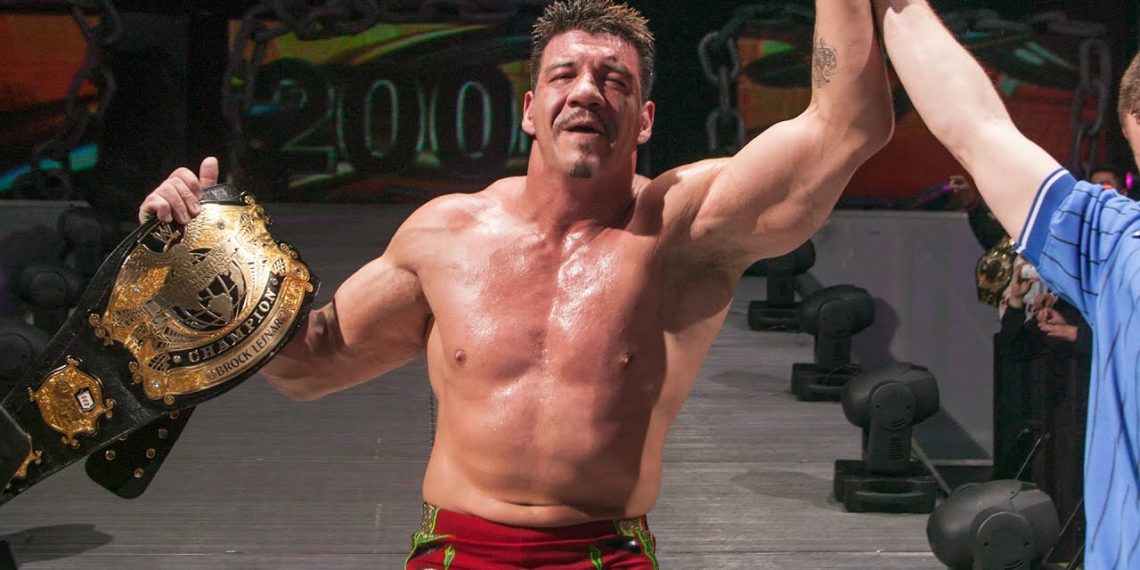During a recent episode of 83 Weeks, Eric Bischoff discussed his decision to bring Eddie Guerrero into WCW when he was the company’s President, highlighting his potential and the circumstances that led to Eddie’s recruitment.
“Do I think — look, when Eddie came in, I was aware of Eddie, but not close. I wasn’t watching them closely. Eddie was working as El Gato in New Japan. I think it was El Gato, was his gimmick in Japan. And I was working closely with New Japan. And I know Masa Saito really appreciated Eddie and liked him a lot. And Eddie became a conversation between myself and Masa Saito was because they wanted to keep Eddie booked as often as they could, but they couldn’t put him on a full time or weren’t willing, I guess, to put him under contract. So when I talked to Masa about what I wanted to do with the cruiserweight division — well before I had my first conversation with Eddie or Chris Benoit or any of those — I had the idea for the cruiserweight division. I was talking to Masa about it because a lot of the talent that I saw would really help make up that division, that talent would have come from New Japan Pro Wrestling, right? So it was Masa Saito that said, ‘No man, hire Eddie. If you can put Eddie under contract, I guarantee I will book him X number of days a year.’
“Well, the reason that that was important, and it was a good financial plan on my part. Because as I’m adding talent to the roster, I’ve got to figure out, ‘Okay, as best I can, how do I justify this? How does this make sense financially? So if I hire a guy,’ whatever I hired Eddie at, I think I brought him in at 175[000] or whatever it was, whatever the number was. I had Masa Saito sitting across from me at the table, saying, ‘Well, I’ll cover half.’ And that was the nature of the relationship that went beyond occasional booking opportunities and things we did on TV. The real opportunity for me to help me manage — because again, at this time, we weren’t profitable, right? We were getting close. So these decisions, despite the fact that Meltzer and Vince McMahon were laying the groundwork for this bulls**t narrative of, ‘He just has to write a check. He doesn’t have to justify it.’ Bulls**t. At that time, I had to justify everything. But when I’m sitting across and I got Masa Saito and Brad Ring saying, ‘No, Eddie Guerrero’s awesome. And if you hire him and put him under contract and we have this deal, we’ll eat half his contract.’ So now I’m getting a guy for 80 or 90 grand a year. Pretty good deal.”
When asked if he saw Eddie Guerrero as a potential top star in WCW at that time, Bischoff candidly acknowledged that he did not, nor would anyone else have at that moment. He credited Eddie for his later success in WWE, emphasizing that Eddie built his own character and reputation. While Bischoff provided the opportunity, he believed that Eddie’s journey in WCW laid the foundation for his future accomplishments and clarified that, at the time, he did not envision Eddie reaching the main event status he achieved in WWE.
“Now, did you see him as potentially being in that top spot in WCW at the time? Of course not, and nobody else would have that was in their right mind, right? Eddie made it to where he made it in WWE as a result of how well he built himself, how well he did for himself, how well he performed, how well he created his own character. I didn’t do that for Eddie. Eddie did that for Eddie. I gave Eddie the opportunity, and I said, ‘Wow, this is good.’ But that was all on Eddie. It wasn’t on me, it wasn’t on anybody else.
“But had Eddie not gone through everything he went through at WCW, he would not have been in WWE. End of conversation. It wasn’t like WWE would have seen the handwriting on the wall with Eddie Guerrero in 1995, ’96, ’97, ’98, or ’99 for that matter, or 2000. Had it not been for the success that Eddie created for himself in WCW. But while he was creating that success, did I ever see him as a potential? No. And in reality, even in 2020 hindsight, sitting here being really honest about it, I just don’t think because of the time and the context of timing… To be able to sit here and honestly say, ‘I could see how Eddie could have done it.’ That would be pandering to this audience. And I won’t do it. I just won’t do it.”
(h/t 411MANIA)


